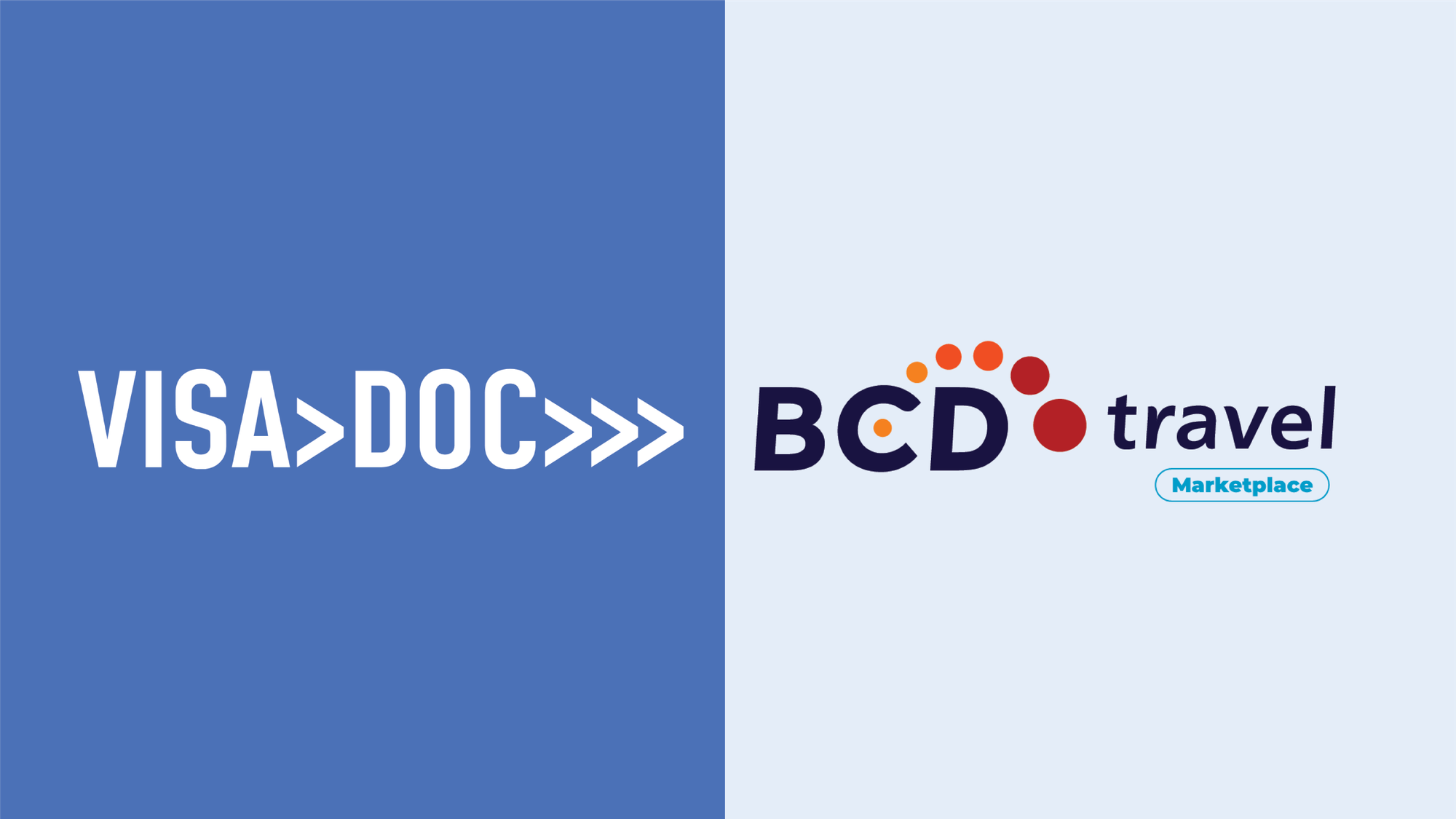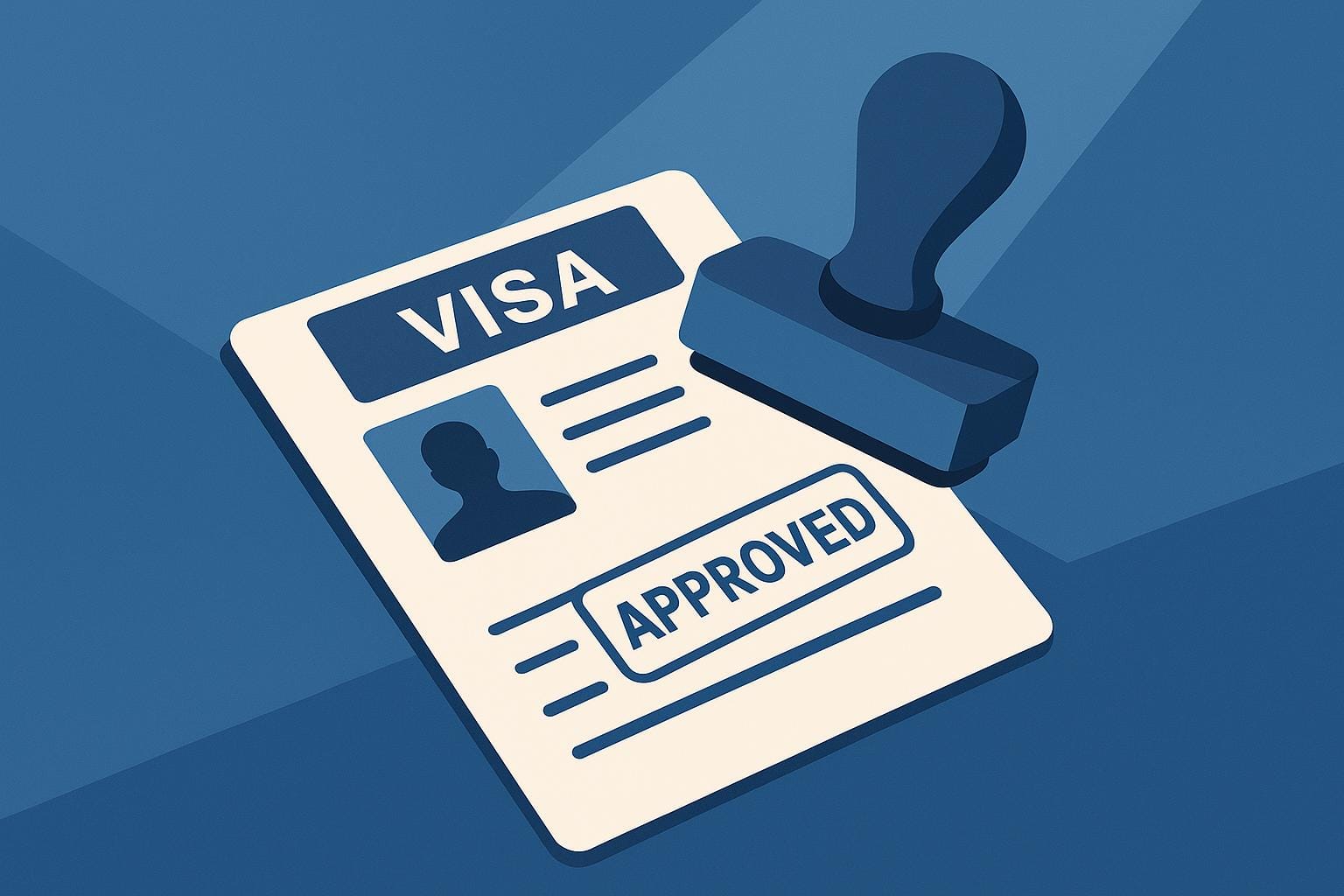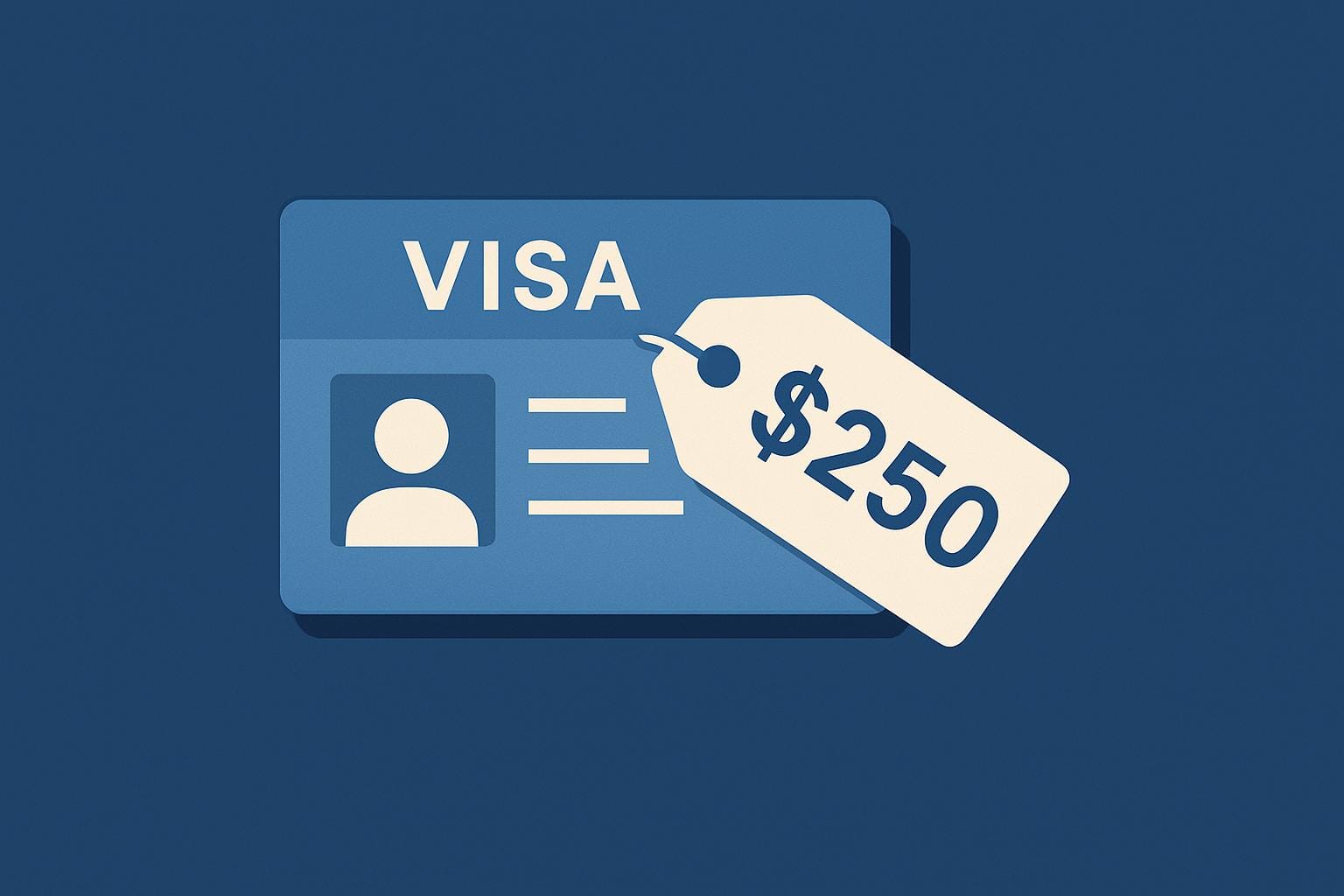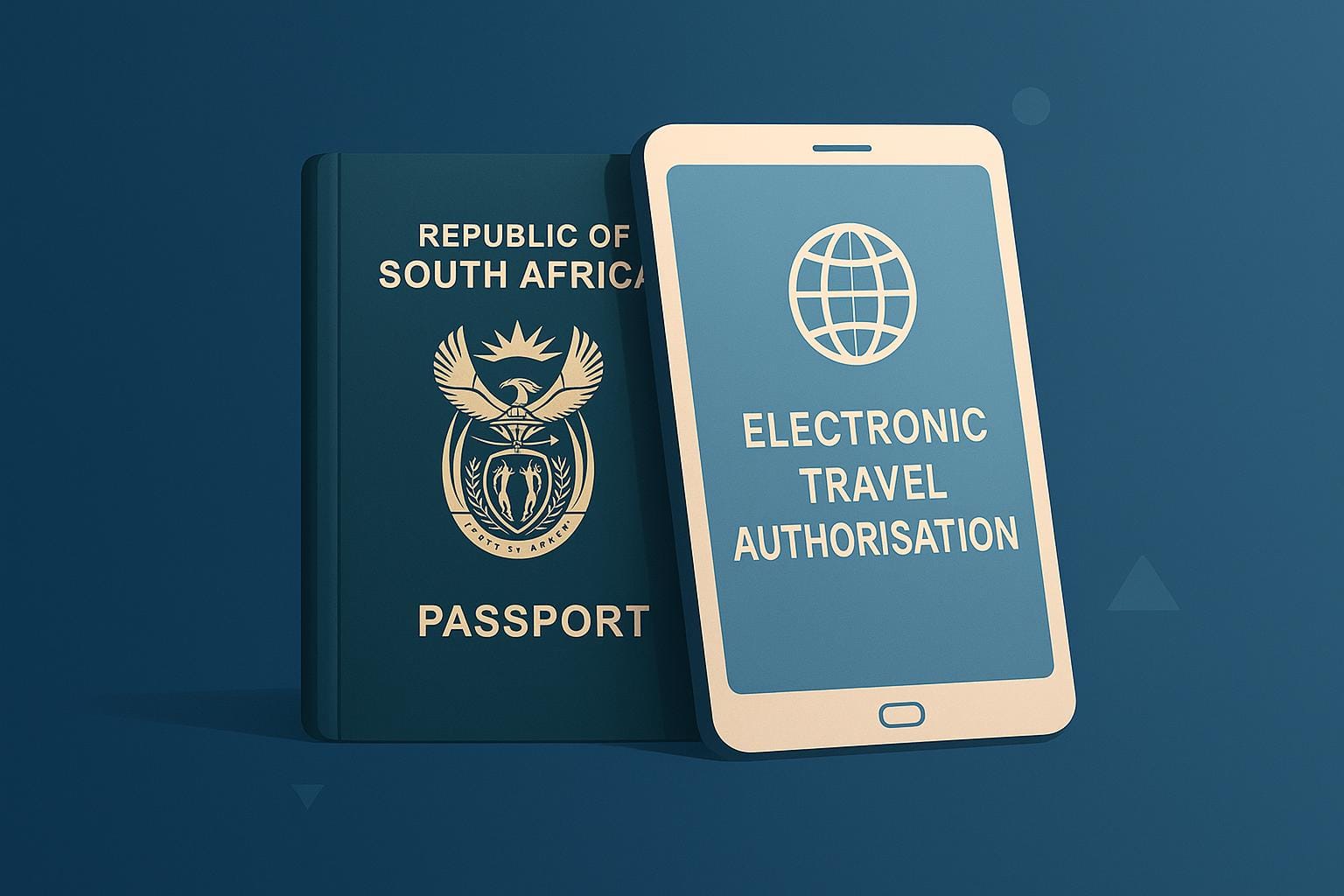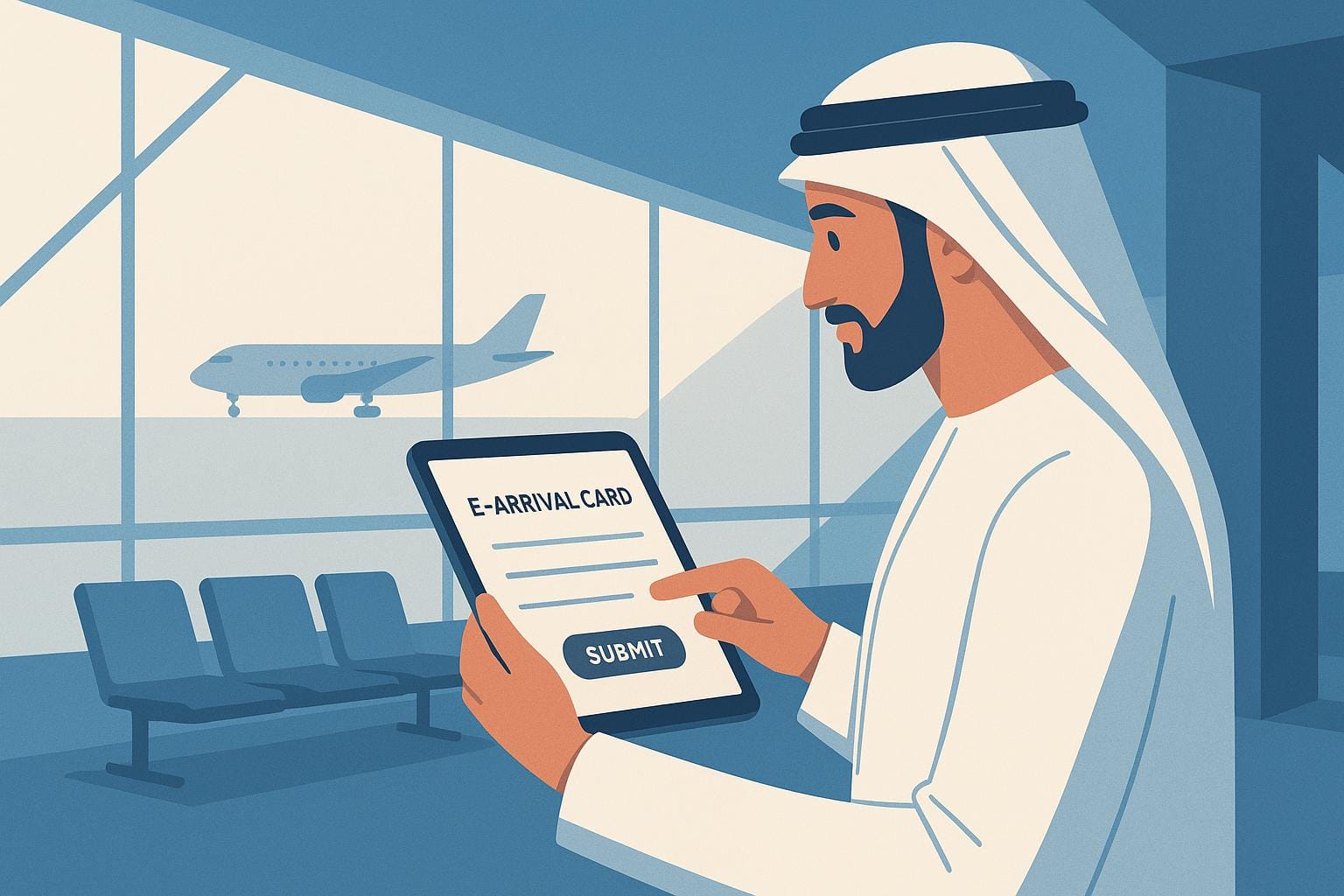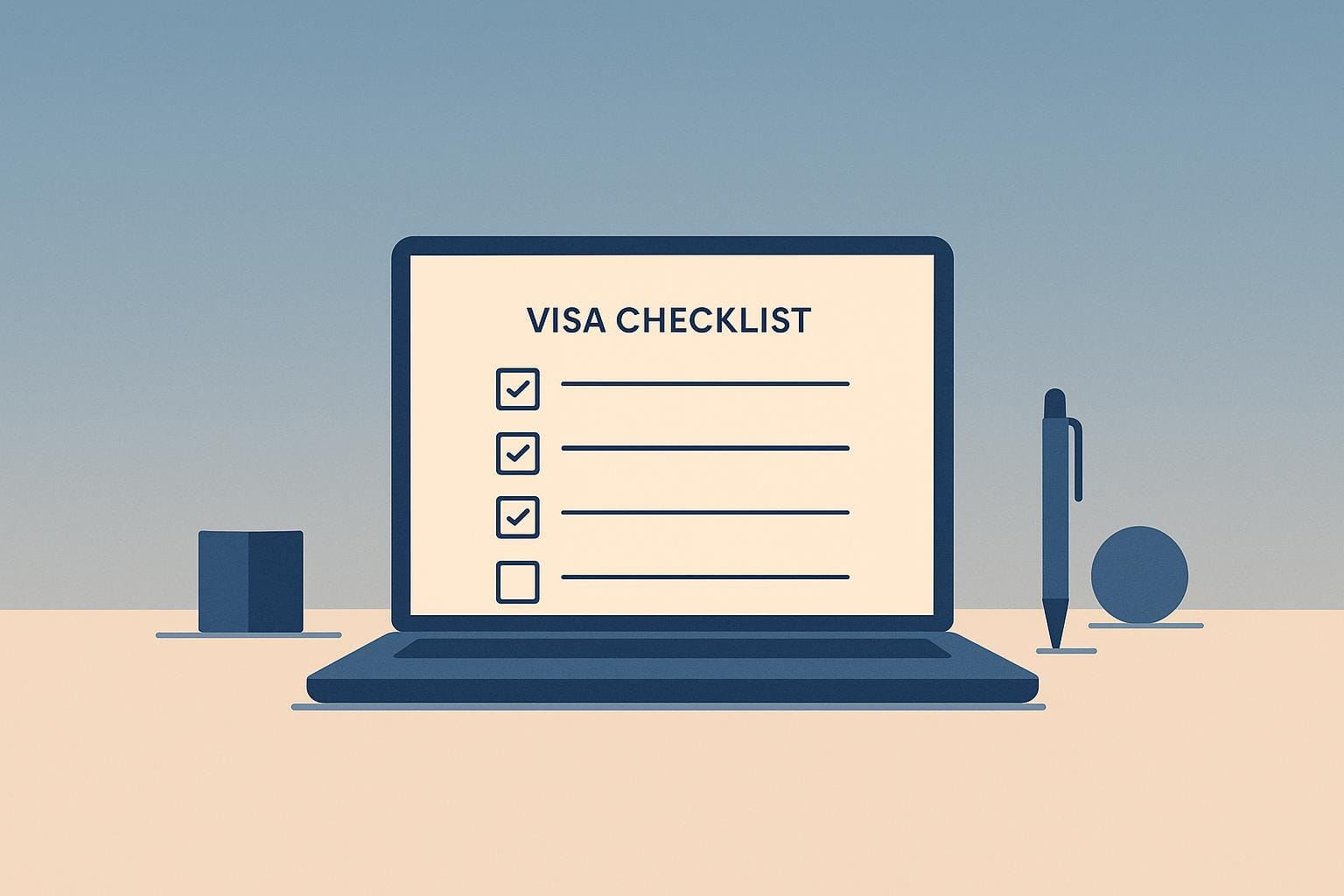Want to secure investor meetings in the UAE? Start with the right visa. The UAE is a global startup hub, issuing over 45,000 business licences in 2024 alone. Whether you're attending pitch meetings, networking events, or conferences, having a proper business visa is essential. Here's what you need to know:
-
Visa Types:
- Visit Visa: Short-term, ideal for temporary engagements like meetings or conferences. Costs start from AED 300 (£65).
- Residency Visa: Long-term options like the Golden Visa (10 years) or Investor Visa, for deeper market entry.
-
Key Documents:
- Passport with validity.
- Passport-sized photos meeting UAE specifications.
- Visa application form (error-free).
- Business registration documents.
- Proof of financial stability (bank statements, salary certificate).
- Invitation letter from a UAE-based company.
- Avoid Common Mistakes: Ensure documents are complete, accurate, and up-to-date to prevent delays or rejections.
Efficient visa management signals organisational competence to investors. Tools like VisaDoc can automate the process, saving time and reducing errors. Stay prepared, meet deadlines, and align with UAE business practices to maximise opportunities in this thriving ecosystem.
Required Documents for UAE Business Visa Applications
Getting your UAE business visa approved starts with having the right paperwork. UAE immigration authorities are strict about accuracy and completeness, so being well-prepared is crucial - especially for investor relations teams planning important pitch meetings. Missing or incorrect documents can lead to delays, and no one wants to reschedule critical business discussions. Here's a clear breakdown of the essential documents you’ll need.
Complete Document Checklist
Every UAE business visa application requires some standard documents. These include:
- A valid passport: Your passport must have enough remaining validity and blank pages for visa stamps. If it’s close to expiration, your application could be rejected.
- Passport-sized photographs: These need to meet UAE specifications - white background, clear facial visibility, and specific dimensions. Using a professional photo service familiar with UAE requirements can save you from unnecessary delays.
- Visa application form: Make sure every detail matches your passport exactly. Even minor errors, like a misspelled name, can cause issues.
- Business registration documents: These confirm your company’s legitimacy and your role within it. Typically, you’ll need your certificate of incorporation, recent registration documents, and a letter from your employer outlining your position and the purpose of your visit.
- Proof of financial stability: Recent bank statements and salary certificates are usually required to show you can support yourself during your stay.
- Invitation letter: This must come from a UAE-based company and include details such as the purpose of your visit, meeting dates, and the relationship between the two companies. The letter should also include the UAE company’s trade licence details.
Document Requirements by Applicant Type
The specific documents you’ll need can vary depending on your role and the nature of your business trip. Here’s a quick guide to help you prepare:
| Applicant Type | Core Documents | Additional Requirements |
|---|---|---|
| Investors | Passport, photographs, application form, proof of financial stability | Investment portfolio, company ownership documents, bank references |
| Employees | Passport, photographs, application form, employer letter | Employment contract, salary certificate, company registration documents |
| Partners | Passport, photographs, application form, partnership agreement | Joint venture documents, legal partnership proof, business plan |
For investors, presenting detailed financial records and bank references is critical to demonstrate your investment capacity. Employees should focus on providing a comprehensive employer letter that clearly states their role and the purpose of their visit. Meanwhile, partners involved in joint ventures or collaborations will need to supply legal documents, such as partnership agreements or business plans, to establish the formal relationship.
Document Mistakes That Cause Delays
Mistakes in your application can lead to frustrating delays - or worse, rejection. Some of the most common errors include:
- Incomplete application forms: Double-check that every field is filled out correctly.
- Mismatched personal information: Details like your name or date of birth must match your passport exactly. Even small discrepancies can raise red flags.
- Outdated or missing documents: Ensure all forms, letters, and supporting documents are up-to-date, legible, and consistent.
- Choosing the wrong visa type: Selecting the incorrect visa category can result in unnecessary complications and costs. Make sure the visa type aligns with the purpose of your visit.
Carefully reviewing all your documents and ensuring they are consistent across the board can significantly improve your chances of a smooth visa approval process. A little extra effort in preparation can save a lot of time and hassle later.
How to Manage Visa Compliance and Applications
Handling visa compliance for UAE business meetings involves setting up clear procedures, working closely with various departments, and leveraging digital tools to secure timely approvals. The goal is to create a system that avoids last-minute rushes and ensures everyone stays on track with deadlines and requirements.
Best Practices for Visa Preparation
Start preparing your visa application 6–8 weeks before your travel date. This timeline allows for processing time and provides a cushion to address any unexpected issues without disrupting your meeting plans.
Double-check all details to avoid delays. A checklist can help verify passport information and registration documents. Even small errors can lead to rejections or requests for additional paperwork.
Be aware of visa expiry dates and renewal rules early on to steer clear of penalties or complications. UAE business visas typically range from 30-day single-entry visas (£75–£108) to multiple-entry visas (£650–£1,080), while Golden Visas can cost between £2,160 and £3,240. Meeting the renewal deadlines is essential to avoid fines or restrictions on entry.
Health insurance compliance is a requirement for most UAE visa applicants. Check that your coverage meets UAE standards before submitting your application. Many corporate insurance policies don’t automatically extend to UAE business travel, so you may need to arrange separate coverage or modify your existing policy.
Choosing the right visa type is equally important. For instance, if your plans involve multiple investor presentations across several trips, a multiple-entry visa could save you time and money compared to applying for single-entry visas repeatedly. On the other hand, a 30-day business visa is often sufficient for a one-off meeting.
Working with Internal Teams
Collaboration between departments like investor relations, HR, and legal is key to staying compliant and avoiding missed deadlines. Clearly define roles and responsibilities from the start to ensure a smooth process.
HR usually handles the administrative side of visa applications, such as collecting employment documents, salary certificates, and coordinating with payroll for financial proof. They also ensure health insurance compliance and keep employee records up to date for visa purposes.
The legal team focuses on verifying business registration documents, partnership agreements, and other corporate paperwork to meet UAE requirements. They also review invitation letters from UAE-based companies, ensuring these include essential details like trade licence information and the meeting's purpose.
Investor relations teams manage the business aspects by scheduling meetings, maintaining investor communications, and aligning business-related documentation with your pitch objectives. They also help time visa applications to coincide with funding rounds or other critical business events.
Regular team check-ins during the application process can help spot potential issues early. Shared calendars tracking deadlines, document submissions, and processing timelines keep everyone informed and aligned.
Digital Tools for Document Management
A digital document management system can simplify the process by providing centralised access to up-to-date documents. These systems can reduce manual work by 85% and speed up document retrieval by 88%, thanks to AI-powered search features. Automated workflows for approvals and document routing also help maintain consistent timelines, avoiding delays caused by internal bottlenecks.
Role-based access controls ensure that sensitive information, such as passport and financial details, remains secure while granting necessary access to relevant team members. Audit trails can further enhance accountability by tracking who accesses or modifies documents.
Integrating these tools with existing systems like CRM or HRMS can streamline workflows by automatically populating application forms with employee data, reducing manual entry errors. Platforms like VisaDoc offer these features along with AI-driven document verification, which identifies potential issues before submission, helping to avoid common mistakes.
Version control is another critical feature, especially when managing multiple revisions of business plans, financial statements, or partnership agreements. It ensures you always submit the most up-to-date information to UAE authorities. Additionally, automated retention policies can help maintain data security by securely disposing of outdated information while keeping historical records accessible for future applications or audits.
These streamlined processes are a stepping stone toward adopting advanced automation for visa processing, making the entire system more efficient and reliable.
Automating Visa Processing with VisaDoc
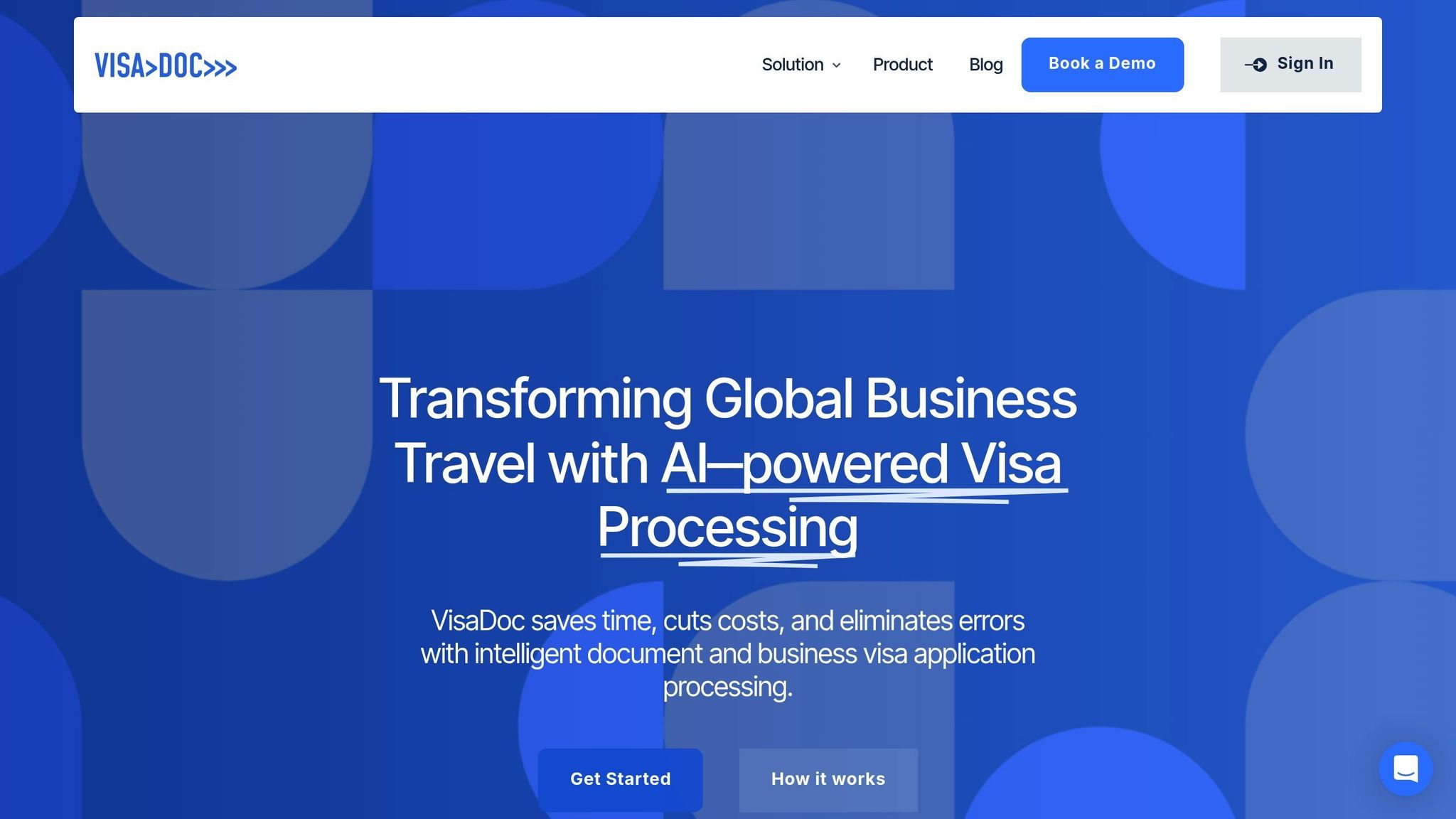
VisaDoc takes the hassle out of visa processing for investor relations teams by replacing time-consuming manual tasks with smart automation. It’s designed to tackle the unique challenges that startups and multinational teams face when juggling multiple visa applications for pitch meetings and investor engagements. Plus, it fits neatly into your existing compliance and HR workflows, ensuring your investor relations activities keep running smoothly.
VisaDoc Features for Business Visa Processing
VisaDoc offers a range of features that make business visa processing easier and more efficient:
- Case Management Dashboard: This central hub provides a clear view of all active visa applications, complete with timelines, document statuses, and communication logs. No more endless email threads - teams can coordinate travel for investor presentations with ease.
- Document Collection and Storage: The platform automatically requests missing documents and keeps track of updates with version control. For UAE pitch meetings, it ensures critical documents like employment certificates, business registration papers, and invitation letters are always up to date and formatted correctly.
- Customisable Workflows: Teams can design tailored workflows for different visa types, such as single-entry or multiple-entry business visas. This ensures every application is processed consistently, aligned with meeting schedules and travel plans.
- Client Portal: Team members can complete questionnaires, upload documents, and track their application status in real time. This self-service feature lightens the administrative load while keeping everyone informed.
- AI-Powered Document Verification: The system flags potential issues like expired passports or missing sponsor information before submission. By catching common problems early, it helps avoid delays in UAE visa approvals.
- Compliance Tools: Features like audit trails, deadline reminders, and status trackers ensure applications meet UAE submission requirements. Built-in alerts for expiring visas, document renewals, and key milestones make manual tracking a thing of the past.
Automation vs Manual Processing Benefits
Managing multiple visa applications for investor meetings highlights the stark difference between manual and automated processing.
| Aspect | Manual Processing | VisaDoc Automation |
|---|---|---|
| Document Verification | Prone to human error during manual reviews | AI-powered checks with automatic error detection |
| Status Tracking | Relies on email chains and spreadsheets | Real-time dashboard with predictive timelines |
| Deadline Management | Requires manual calendar reminders | Automated alerts and compliance notifications |
| Document Storage | Basic cloud storage or physical files | Secure, version-controlled management |
| Team Coordination | Involves multiple departments and touchpoints | Centralised platform with role-based access |
| Compliance Monitoring | Manual checklist reviews | Built-in audit trails and compliance tracking |
VisaDoc’s automation significantly reduces the administrative workload for caseworkers, while also minimising compliance risks. Automated reminders, pre-filled forms, and client self-service features save time and free up legal and HR teams to focus on more strategic tasks.
In contrast, manual processes often lead to missed deadlines, resulting in penalties or application rejections. VisaDoc’s automated system ensures critical dates and requirements are always monitored, helping teams avoid costly mistakes.
Integration with Corporate Systems
VisaDoc doesn’t just stop at visa processing - it integrates seamlessly with your corporate systems to streamline travel and visa coordination. It connects with HR platforms, Microsoft Office, and travel booking systems to create a comprehensive solution for business travellers.
For example, employee data from HR systems can automatically populate visa application forms, reducing errors and speeding up the process. Once a visa is approved, the platform can trigger travel bookings and notify team members, making the entire workflow smoother.
Thanks to API connectivity, VisaDoc works within your existing systems without requiring teams to switch to unfamiliar tools. It acts as a specialised layer for visa processing, while maintaining strong links to HR management and travel coordination. This integration eliminates silos, paving the way for efficient investor travel planning and streamlined global mobility management.
Preparing for UAE Pitch Meetings: Investor Relations Guide
Coordinating Travel and Visa Timelines
Getting your visa sorted on time is crucial when aligning with investor schedules in the UAE. Standard business visas typically take between 3 to 10 working days to process, while urgent requests can be handled in just 1 to 3 working days. To avoid last-minute hiccups, aim to submit visa applications at least two weeks before your planned meetings. This buffer allows for any unforeseen delays or the need to correct documentation.
For example, if your pitch meeting is scheduled for mid-March, submitting visa applications by early February is a smart move for standard processing. If time is tight, urgent processing can be a lifesaver, though it comes at a higher cost.
Visa fees vary depending on the type and duration:
- 30-day visa: AED 350–500 (£75–108)
- 90-day visa: AED 800–1,500 (£173–324)
- Multiple-entry visas: AED 3,000–5,000 (£649–1,081)
These costs can add up, especially if you’re travelling with a team or planning multiple trips, so it’s wise to include them in your budgeting.
One common pitfall is incomplete or incorrect documentation, which often leads to visa rejections. Double-check all paperwork to avoid this. If a visa is denied, you can usually appeal by providing additional documents or clarifications, but this process can take weeks, potentially derailing your schedule. Beyond timely visa management, having a strong set of supporting documents can also positively influence investor confidence.
Additional Supporting Documents to Prepare
Visa paperwork is just the beginning. A successful pitch in the UAE hinges on a well-prepared document package that showcases your business’s credibility and readiness for the market.
Start with a concise, 10–15 slide pitch deck tailored specifically for the UAE audience. This presentation should highlight local market opportunities, address regional nuances, and align with regulatory expectations. For context, the UAE’s digital economy is projected to hit $140 billion by 2031, and the e-commerce sector alone could grow to $4 billion by 2026. These figures underline the importance of grounding your pitch in local market realities.
Your financial documents must comply with IFRS standards and include key elements like your income statement, balance sheet, cash flow statement, and financial projections. Use conservative estimates and emphasise positive cash flow or contingency plans. Investors in the UAE are known for their rigorous financial scrutiny - after all, the country’s startup ecosystem attracted over $1.8 billion in venture capital in 2025.
Additionally, prepare an Information Memorandum (IM) that dives deeper into your business model, market analysis, and growth strategy. Highlight any partnerships with UAE-based companies, government incentives you’re tapping into, and your grasp of local regulations. Research government programmes that align with your business and demonstrate how your startup supports the UAE’s economic diversification goals. These details not only validate your preparedness but also strengthen investor confidence in your alignment with local priorities.
UAE Business Practices and Regulations
While visa management and solid documentation set the groundwork, understanding the UAE’s business culture is what truly builds trust with investors. The UAE blends Islamic values with modern business practices, making personal relationships and trust essential.
Hierarchy is highly respected in UAE business culture. Address investors with their proper titles and avoid using first names unless invited to do so. Patience is also key - hard-sell tactics common in Western markets may not yield the same results here.
Professional attire is another important consideration. Opt for conservative, polished outfits with buttoned collars and clean lines, steering clear of bold patterns. Be mindful of prayer times when scheduling meetings, especially during Ramadan when business hours may be shorter. The UAE workweek runs from Sunday to Thursday, so plan accordingly. Demonstrating awareness of Islamic customs reflects respect and cultural intelligence.
Corporate social responsibility (CSR) is gaining prominence in the UAE. Many companies are now required to engage in CSR initiatives and report on them. If your startup has CSR programmes or community impact projects, make sure to spotlight them during your pitch. As one saying goes, "The tree's strength lies in its roots".
Lastly, stay informed about the UAE’s new Corporate Tax regime and its implications for financial reporting. Showing that you understand local tax obligations and compliance requirements can further bolster investor confidence. The UAE is recognised as the least corrupt nation in the Middle East and North Africa by Transparency International, and investors expect their partners to uphold similarly high ethical standards. It’s also worth noting the progressive nature of the UAE’s workforce - 71% of Emirati university graduates in 2018 were women, highlighting the importance of inclusive practices.
Conclusion: Building Investor Confidence Through Proper Visa Management
Managing visas efficiently is more than just an administrative task - it’s a strategic move that can elevate investor confidence and drive business success in the UAE's thriving startup ecosystem. When your team handles visa processes smoothly and demonstrates cultural understanding, you're sending a clear message of operational excellence - something investors deeply appreciate.
The UAE has firmly established itself as a regional investment powerhouse. In the first half of 2024, the country accounted for 36% of all deals across MENA, with investor activity soaring by 58% compared to the previous year. This surge is largely due to international investors recognising the UAE's dedication to fostering a business-friendly environment. Successfully navigating visa requirements is not just a necessity; it’s a testament to your ability to thrive in a sophisticated and competitive market.
The importance of proper visa management extends beyond compliance. For instance, Dubai's General Directorate of Residency and Foreigners Affairs launched the Salama AI platform in 2023, enabling online visa renewals in under two minutes. This innovation underscores the UAE's commitment to efficiency - a standard that investors expect from businesses they support. Conversely, poor visa management can lead to significant setbacks, such as costly fines or even operational bans for repeated errors. These scenarios highlight why investors pay close attention to how companies handle vital processes like visa compliance, as it reflects broader organisational competence.
Tools like VisaDoc offer a game-changing advantage by automating compliance checks and streamlining real-time processing. With 56% of organisations still relying on outdated methods like Excel spreadsheets for global mobility management, adopting advanced automation tools not only reduces errors but also positions your company ahead of the competition.
Industry leaders also recognise the critical role visa policies play in shaping the UAE's business landscape:
"The Golden Visa represents a transformative step in the UAE's strategy to enhance its business environment and attract talent and investments. It not only offers legal and administrative conveniences but also strengthens the UAE's position as a global business hub."
This insight from MBG Legal Consulting emphasises how the UAE's forward-thinking visa policies create opportunities for startups ready to navigate them effectively. Mastering these processes isn’t just about compliance - it’s a key part of your value proposition to investors evaluating your ability to succeed in global markets.
FAQs
What are the advantages of using VisaDoc to manage UAE business visa applications for pitch meetings in the startup ecosystem?
VisaDoc makes handling UAE business visa applications much easier by automating the process and minimising errors. With its AI-powered platform, it simplifies documentation and compliance checks, speeding up approvals while saving both time and effort.
For investor relations teams gearing up for pitch meetings, VisaDoc offers an efficient, hassle-free solution designed for the fast-moving startup world. By automating essential tasks, it frees up teams to concentrate on nurturing investor relationships instead of getting bogged down by paperwork.
What steps can startups take to ensure their UAE visa applications meet business requirements and avoid common errors?
To make your UAE visa application process as smooth as possible, startups should prioritise compiling accurate and complete documentation. Key paperwork often includes proof of business ownership, investment certificates, and a well-defined strategic business plan. It's worth taking the time to double-check every document to ensure they meet UAE regulations, such as Economic Substance Rules (ESR) and Anti-Money Laundering (AML) standards.
Understanding the different visa types available for startups is equally important. Make sure all forms are correctly completed, and steer clear of common pitfalls like submitting incomplete applications or using outdated documents. Consulting with professionals who specialise in UAE business and visa processes can be a smart move, helping to speed up approvals and minimise any potential delays. A meticulous approach and thorough preparation can make all the difference.
What cultural considerations should investor relations teams keep in mind when preparing for pitch meetings in the UAE?
When getting ready for pitch meetings in the UAE, it’s important to honour Islamic customs and traditions. Dress modestly - men should wear suits, while women should choose professional outfits that cover their shoulders and knees. Also, try to avoid scheduling meetings during prayer times or the holy month of Ramadan unless it’s absolutely unavoidable.
Building trust is a cornerstone of business in the UAE. Start with casual conversation before jumping into business matters - it helps establish rapport. Keep in mind the hierarchical structure in Emirati culture. Always address senior team members first, and use professional titles where appropriate. A polite, patient approach and a genuine interest in their culture can go a long way in leaving a positive, lasting impression.
Related Blog Posts
- India Business Travel Guide: Visas, Permits, and Cultural Tips for Success
- Preparing for Visa Interviews: Tips to Help Your Employees Succeed
- UAE Business Meeting Visa Express: 14-Day Entry Options for Executive Delegations
- Nigeria's 48-Hour Business Visa on Arrival: Documentation for Emergency Equipment Repair Teams




